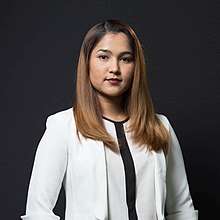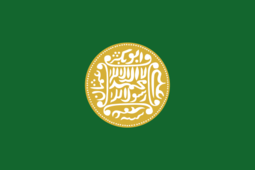Wai Wai Nu
Wai Wai Nu (Burmese: ဝေဝေနု; born 1987) is a Burmese activist who advocates for the rights and equality of all people in Myanmar, including the Rohingya. She was listed one of the BBC 100 Women in 2014. In 2017, she was named one of Time magazine's Next Generation Leaders.[2][3]
Wai Wai Nu | |
|---|---|
ဝေဝေနု | |
 | |
| Born | 1987 (age 32–33) Buthidaung, Myanmar |
| Nationality | Burmese |
| Alma mater | University of East Yangon |
| Occupation | Political activist |
| Parent(s) | U Kyaw Min [1] and Teza |
| Awards | Hillary Clinton Award (2018) |
| Part of a series on |
| Rohingya people |
|---|
 |
|
Conflict and persecution Events
Massacres
|
|
|
Biography
Wai Wai Nu was born on 1987 in Buthidaung, Rakhine State, Myanmar to Rohingya parents. She grew up in Buthidaung.[2][3] Her family moved to Yangon in 1993 because of her father's political activism; Kyaw Min continually fought for labor rights and was harassed by the junta.[4][5] Wai Wai Nu was admitted into the University of East Yangon to study law at age 16.[3]
Imprisonment
When Wai Wai Nu was 18 years old in 2005, her parents and all their children were arrested.[2][5][6][7] She was in her second year of law school at Yangon East university. Her father had been voted in as a member of Parliament in the 1990 general election, but the military junta refused to recognize the election as he was the member of an opposition party.[3][4][5][6][7] The family did not have any legal representation, and the judge did not take any notes during the trial. Her parents and siblings, along with Wai Wai Nu, were convicted of breaking the immigration law named a threat to the state[2] She was sentenced to 17 years in Insein Prison in Yangon; she was kept in a large room together with her sister and mother while her father received a sentence 47 years in solitary confinement, and her brother was sent to a separate prison. While in prison, Wai Wai Nu spoke to women imprisoned with her, and learned their stories, later calling her imprisonment a "life education."[6] The whole family was freed in January 2012, at the age of 25 after president Thein Sein declared amnesty.[2][3][4][6][7][8] Her sister contracted Hepatitis C and father developed a heart condition due to bad prison conditions.[6]
Activism and education
Wai Wai Nu went on to earn her law degree by continuing her studies at Yangon East University.[2][4][6] She then enrolled in a British-Council-organized one-year political education program.[4][6] She also went to other political trainings.[3][4]
Wai Wai Nu founded two NGOs - Women's Peace Network-Arakan and Justice for Women. Through Women's Peace Network, she focuses on peace-building in Myanmar, it is building peace for all people of any gender, ethnicity and religion. Justice for Women is a network of female lawyers that provide legal aid for women in need.[4][5][6][9] Wai Wai Nu educates women on issues relating to abuse, such as domestic violence and sexual harassment.[2][3] Wai Wai Nu launched a successful Twitter campaign called "#MyFriend," that aimed to show friendships between diverse individuals to promote tolerance.[2][3][4][6]
Wai Wai Nu has also spoken at many organizations. In 2017, she spoke to the Oslo Freedom Forum.[4] She also has advocate at United Nation on human rights situation in Burma.[4] Wai Wai Nu has been invited to both the United States White House and the United States Congress.[6][9] As of 2017, Wai Wai Nu was earning her Master of Laws degree from the University of California, Berkeley.[4]
Honors and awards
In 2015, Wai Wai Nu was named one of the Top 100 Global Thinkers by Foreign Policy Magazine.[4][6][10] Also in 2015, she participated in the inaugural class of a training program for young leaders held at the George W. Bush Presidential Center. The program, called the Liberty and Leadership Forum, was focused on democratic transition training.[4][9] In 2016, she was named one of Salt and Diageo's 100 Inspiring Women by Salt Magazine.[11] In 2017, she was named one of the Next Generation Leaders by Time magazine.[2] In 2018, she received the Hillary Clinton Award from Georgetown University.[12]
References
- "U Kyaw Min".
- Solomon, Felix. "The Activist Bridging a Democratic Divide". Time. Time. Retrieved 11 May 2018.
- Jones, Robert. "Wai Wai Nu - Rohingya Human Rights Activist". Infinite Fire. Infinite Fire. Retrieved 11 May 2018.
- "From Political Prisoner to International Inspiration: LL.M. Student Wai Wai Nu". Berkeley Law. Berkeley Law. Retrieved 11 May 2018.
- "Meet Wai Wai Nu, Burma". Nobel Women's Initiative. Nobel Women's Initiative. Retrieved 11 May 2018.
- Reed, John. "Myanmar activist Wai Wai Nu: 'Prison was really a life education'". The Financial Times. The Financial Times. Retrieved 11 May 2018.
- "Layers of Marginalisation: Life for Rohingya Women - Testimony from Myanmar" (PDF). The Equal Rights Review. The Equal Rights Review. Retrieved 11 May 2018.
- Beech, Hannah. "What Happened to Myanmar's Human Rights Icon?". The New Yorker. No. October 2, 2017. The New Yorker. Retrieved 11 May 2018.
- "Wai Wai Nu". George W. Bush - Presidential Center. George W. Bush - Presidential Center. Retrieved 11 May 2018.
- "Wai Wai Nu". Foreign Policy Magazine. Foreign Policy Magazine. Retrieved 11 May 2018.
- "#97 Wai Wai Nu". Salt Magazine. Salt Magazine. Retrieved 11 May 2018.
- "Wai Wai Nu - Hillary Clinton Award". Georgetown University. Retrieved 11 May 2018.